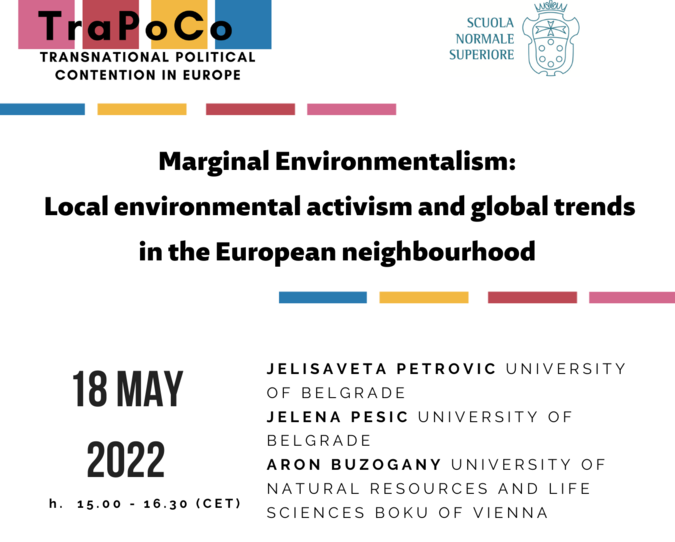Marginal Environmentalism

Seminar by J. Pešić, University of Belgrade, J. Petrović, University of Belgrade, Aron Buzogany, University of Natural Resources and Life Sciences BOKU of Vienna, at Scuola Normale Superiore, Florence in the frame of the Jean Monnet project "Transnational Political Contention in Europe
Jelena Pešić, University of Belgrade – Faculty of Philosophy
Jelisaveta Vukelić, University of Belgrade – Faculty of Philosophy
Europeanization From Below at the Semi-Periphery: Potentials for Transnationalization of Grassroot Environmental Movements in Serbia
Growing body of research conducted in developed countries reveals that social movements are increasingly expanding their transnational ties, identities and repertoires of action. However, opportunities for transnationalization of different types of discontent are less available for social movements operating outside the Global North. Recent literature warns us that models of transnationalization, developed in Western European or North American contexts, are not easily applicable in post-socialist countries: forms and patterns of the transnationalization of movements at the semi-periphery or periphery do not necessarily follow the trajectory of social movements from the core countries. Thus, we have to take into account multidimensionality of transnational spaces and characteristics of transnational movements. These general remarks could easily be applied to environmental movements in post-socialist countries, and especially to those countries that are still in the process of accession to the European Union.
European environmental policies strongly influenced development of environmental movements in Western Balkans countries on the road to EU accession, both in terms of domestication of the European environmental acquis and the externalisation of environmental concern from the local and national contexts to the level of the Union. However, compared to their Western and Northern counterparts, environmental organisations from the region have lower potential and resources to influence decision-making, build international alliances, and benefit from transnational collaborations. Furthermore, the EU is giving mixed messages about the preferred type of economic development in transition countries, often subordinating economic development to environmental issues, and thus producing adverse consequences on environmental transformation of the region.
The aim of this presentation is to explore the “Europeanization from below” by focusing on local environmental initiatives in Serbia with an overall question of potentials of grassroots activism to create significant environmental impact in a semi-peripheral context. By linking the concepts of environmentalism of the poor/dispossessed and the transnationalization (Europeanization) of environmental protests through the example of the protests against small hydropower plants in Serbia, we will try to show how local grassroot movement that grew out of a tradition of non-politicised everyday environmentalism, transformed into a rebellion of the dispossessed and then tried to organise at national and transnational level, both using assistance from EU institutions and international environmental organisations to leverage national authorities and developers, and remaining critical of certain EU environmental policies and practices.
Aron Buzogány, University of Natural Resources and Life Sciences (BOKU), Vienna
Marginal environmentalism: Local environmental activism and global trends in the European neighborhood
One of the main ingredients for ecological transformations is citizen mobilization; citizen mobilization has often been at the core of the transformation of human relationship to nature. At the same time, the paradox of environmentalism is that it needs to act simultaneously both at the local and the global level as ecological problems are essentially glocal – that is both global and local. For environmental organizations and movements, managing the intersection between local and global in their daily work is often an intricate exercise that can be mutually reinforcing but also lead to contradictions and difficult trade-offs. After conceptualizing the role of transnational networks as an opportunity structure, as resource, and a discursive frame used by civil society organizations the presentation will focus on different types of networks in the field of environmental, climate and resource and their local embedding in the European neighborhood.
The COSMOS Talks are public discussions on cutting edge contentious politics research from across various theoretical, methodological and disciplinary traditions. They aim to provide feedback on preliminary results of current research projects, future research projects proposals and drafts of forthcoming papers, articles and book chapters. The COSMOS Talks also aim at improving synergies and networking among researchers from the COSMOS community as well as from other universities.
To reserve a seat for the events in presence you will be requested to fill in the reservation form published on SNS Florence seminars’ webpage .
Download:
The European Commission's support for the production of this publication does not constitute an endorsement of the contents, which reflect the views only of the authors, and the Commission cannot be held responsible for any use which may be made of the information contained therein. The project's page Trapoco


